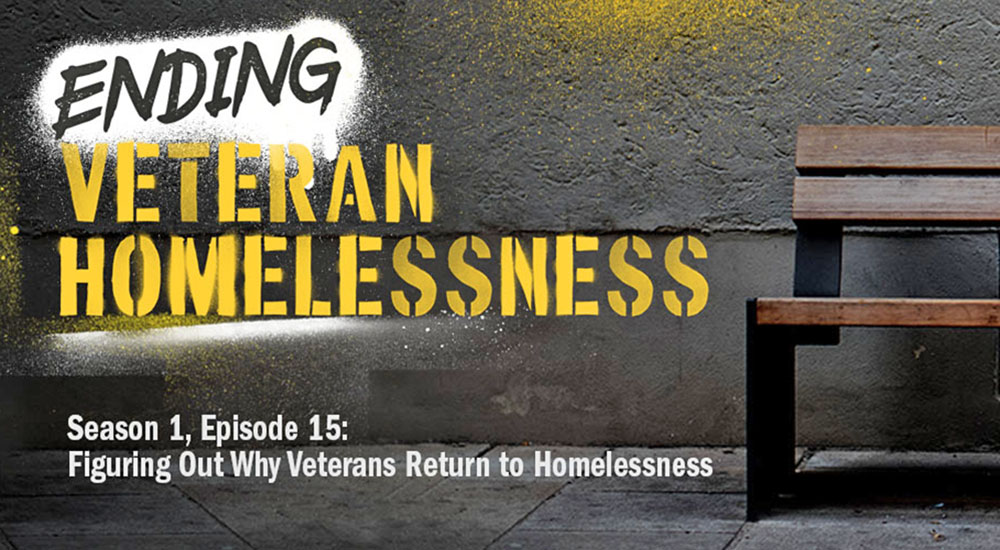Just as an illness can stubbornly resurface, threatening to undo the progress made with one’s health, too many Veterans face a similarly harrowing recurrence: the return to homelessness. These Veterans now find themselves fighting a different battle on the very streets they once fought to protect.
On July’s episode of the Ending Veteran Homelessness podcast we welcome guests Dr. Jack Tsai, research director for VA’s National Center on Homelessness among Veterans; Dr. Thomas Byrne, an investigator with both the VA National Center on Homelessness among Veterans and the Center for Healthcare Outcomes and Implementation Research at the VA Bedford Healthcare System; and Ken Mueller, senior business operations specialist in the Homeless Programs Office, to help us learn about returns to homelessness.
We dive into the complex issue of Veterans returning to homelessness, seeking to understand the underlying reasons behind this distressing trend.
Listen to “S1EP15: Figuring Out Why Veterans Return to Homelessness” on Spreaker.
Returning to homelessness
For many Veterans, getting help through VA’s homeless programs is a feat. They may have been skeptical about getting help in the past but were finally able to get the support they needed and deserved. Going through the steps to access stable housing can be difficult, which often makes a return to homelessness feel even more devastating.
A Veteran could return to homelessness for a variety of reasons, including a change in income or employment status, rent increasing beyond their financial resources, limited family and social support, or medical issues for themselves or their family members.
Risk factors
After Veterans successfully exit a VA homeless program, the risk of returning to homelessness is the highest in the first 90 to 100 days after being placed in permanent housing. But for some, that risk is higher than average.
In a recent VA study, the risk factors influencing the likelihood of a Veteran’s return to homelessness included having experienced military sexual trauma, alcohol or drug use, mental issues, having serious health conditions requiring inpatient healthcare services, and lacking social support. We can conclude that those who have more intensive health conditions or are having a health crisis have an increased risk of a return to homelessness.
“What we’re seeing are indicators of folks who need a little bit more support and some implications for making sure they are connected to the supports that they need,” said Byrne.
“The important thing is that we recognize when it does happen and that we then work toward getting that Veteran back into housing,” Mueller noted.
What VA is doing to help
The current VA policy known as Housing First aims to provide Veterans with housing, along with essential services such as healthcare, counseling, specialty care and other support they need to stay housed. The approach does not try to determine who is “housing ready” or demand treatment prior to housing. Instead, treatment and other support services are wrapped around Veterans as they obtain and maintain permanent housing.
VA is also improving how it is keeping track of Veterans who exit VA homeless programs to ensure they are being continuously identified in the system. This helps ensure that if a Veteran does return to homelessness, they can be reengaged and assisted to get them back into housing as soon as possible.
The future of care
As VA researchers continue to learn more about what determines the likelihood of returns to homelessness, they are also focusing on subgroups of Veterans to identify their unique risk factors. For example, female Veterans, aging Veterans and Veterans in particular homeless programs may all have different factors that put them at risk of returning to homelessness.
Learn more about VA programs
If you are a Veteran who is homeless or at risk for homelessness, call the National Call Center for Homeless Veterans at 877-4AID-VET (877-424-3838).
Visit the VA Homeless Programs website to learn about housing initiatives and other programs for Veterans exiting homelessness.
Check out the Ending Veteran Homelessness podcast to learn more about what VA is doing about Veteran homelessness.
Learn how to get involved with housing homeless Veterans.
For more stories like these, subscribe to the Homeless Programs Office newsletter to receive monthly updates about programs and supportive services for Veterans experiencing or at risk of homelessness.
Topics in this story
Link Disclaimer
This page includes links to other websites outside our control and jurisdiction. VA is not responsible for the privacy practices or the content of non-VA Web sites. We encourage you to review the privacy policy or terms and conditions of those sites to fully understand what information is collected and how it is used.
More Stories
Bob Jesse Award celebrates the achievements of a VA employee and a team or department that exemplifies innovative practices within VA.
The Medical Foster Home program offers Veterans an alternative to nursing homes.
Watch the Under Secretary for Health and a panel of experts discuss VA Health Connect tele-emergency care.







I’ve found that most people that are homeless, choose to be. They do not want to give up their drugs and alcohol, or their life style. Also do not want responsibility for themselves or actions.
I’m not homeless but I have very bad issues with self-isolation. My more severe episodes have lasted several years. During those times I was getting my groceries delivered and ordering everything else I need from Amazon. My bills are all paid online. I eliminated any possible need to leave the house or even talk to anyone. It could get so bad that I began to notice that my speech patterns were degrading. Even then I could prevent that by talking to Amazon Alexa or one of the online AI apps. If I were homeless, I could probably figure out how to do all this with my cell phone. I am wondering if some aspects of my condition might affect homeless veterans as well. I would be available if you wanted to look into this in more detail.